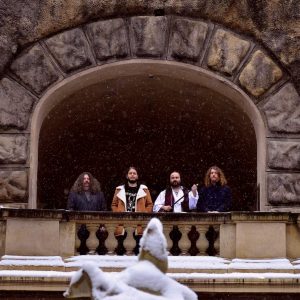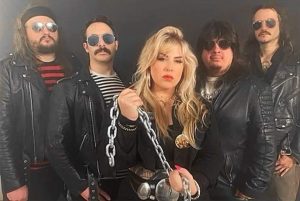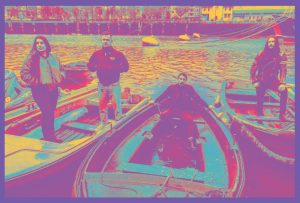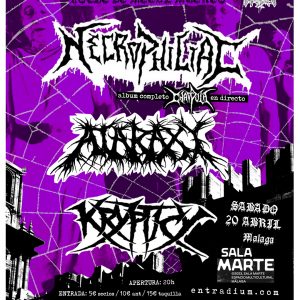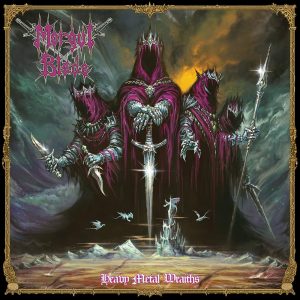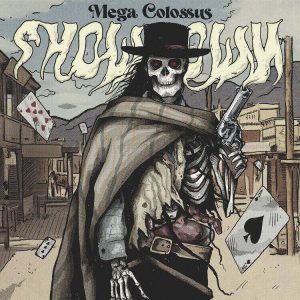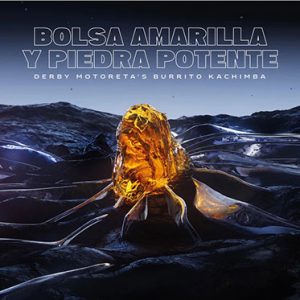BONES (Eng.)
– Hi Jon, thanks for taking the time. If you don’t mind, I would like you to start making some history of the band…
Hi Tania! The band came to be in the summer of ‘09. I was playing in 2 other bands and I just wasn’t feeling satisfied with either one. I called my old friend, and drummer from Usurper, Joe Warlord and basically told him I wanted to start jamming! He brought his drums over to my house and we got started right away. I was playing guitar and we were looking for a bass player who could sing too. I didn’t really want to do either. We couldn’t find anyone that fit the bill though. We were hanging out with our old friend, and ex Usurper guitarist, Carcass Chris one night pounding beers, and we thought we should just have him play guitar and I’d play bass and sing. We got to work immediately!
– All of you previously played in USURPER, what prompted forming BONES? As it has a bit different style…
The last few years of Usurper were really stressful. When the band finally broke up it was almost a relief! I was free to do whatever I wanted. I played in Kommandant for a few years, and I was also touring and playing live with another Chicago band. It kept me really busy, but I wasn’t really satisfied. I was contributing songs to the other bands, but they didn’t fit their style. I missed playing with my old Usurper bandmates! I was just a soldier in another man’s army, and I felt like I had to do something that had my own personality to it. I knew that playing with Joe and Chris would be perfect and fortunately they were available at the time. No egos. No attitudes. We’ve been playing together for so long that songwriting comes perfectly naturally to us. We know how to get it done and there is almost no need for discussion. The style is a little different from Usurper because we didn’t do much of the songwriting in Usurper. Almost everything was written by Rick Scythe in Usurper. Bones material is co-written by all 3 of us. On this 1st album there are some similarities to Usurper, and I guess that’s unavoidable. We were in that band for 13 years. It’s left a mark on us, but we don’t want to be Usurper Junior or anything like that. We’re slowly finding our own sound and growing as a band. We’re influenced by lots of good, classic punk, dirty rock & roll and that kind of shit, so those elements are starting to creep their way into the new material.
– Your latest album with USURPER was released back in 2005; what were you guys up to during that time?
We were in our usual drug crazed and intoxicated state! Usurper was a mess towards the end. We should have broken up after our original singer, Diabolical Slaughter, quit. But we soldiered on anyway. Usurper meant so much to all of us in the band, that I don’t think we knew how to be reasonable and do the respectful thing and end the band….
– That album was releaed via a big label such as Earache and this new one has been released through a smaller one, Planet Metal. What are the pros and cons of this?
At the time, when Usurper signed to Earache in ‘01, we thought it was the best thing possible for the band. We thought it was really important to have a big label behind us to push the album. Keep in mind that back then things were a little different than they are today. People were still buying albums and downloading hadn’t really caught on yet. So back then it was important to have good distribution. That was our main concern, was making sure that the cd would be available in stores so people could buy it. iTunes wasn’t around yet. Nobody knew what Napster was yet. So that was the mentality. The problem with being on a big label is that a big label has lots of expenses. Sometimes they have offices in different countries. Those offices need to have a staff that need to be paid. They have major bills to pay and they need to sell records to pay them. From a large label standpoint, the emphasis is on business. Its all about sales and who is performing and who isn’t performing. Usurper never sold a lot of records. We were an underground band that wasn’t particularly original or groundbreaking. So the business end swallowed us up in the end. Being on a small label is much more relaxing. You
can focus entirely on the music. In today’s day and age, underground music isn’t bought in as many record stores. It’s bought by underground diehards through reliable underground sources and distros, or it’s purchased online. There isn’t a need to emphasize thorough distribution the way it used to be. Also, smaller labels are usually run by diehard metal fans who are business savvy. Oftentimes, in the case of a small label, the emphasis is on the quality of the release, as opposed to moving huge numbers of units. A lot of times these guys are putting out music that they want to hear. If they’re smart and control their costs, they can make their money back and even turn a small profit. In the case of Planet Metal it’s run by a business savvy, diehard metalhead, who also plays in a bunch of good bands. This means he understands all the subtle things that bigger labels either don’t know, or chose to ignore. When Bones started we had to decide what road to take. Should we record a demo and approach larger labels, or should we go back to working closely with a small label? We all decided that it was in our best interest to work with a small label, especially in the beginning. Planet Metal is exactly what we were looking for. I approached label head Chris Black at a local show and asked him if he was interested before I sent anything to anyone else. He said he was, so we made an initial handshake deal. During the recording of the album he came out with a contract, and now we control the world!!!!!!!!
– You have just released your debut album, «Bones». To all those that haven’t listened to it yet; what are they going to find on it?
Some filthy, raw, unpolished metal!
– I think one of the first things that stand out of it is, for example, the «old school» sound. How easy is achieving this nowadays?
For us it was simple. We didn’t approach the album as using the studio to make things sound bigger or better than they really are. We just wanted to capture what we sound like live. Too many bands in today’s scene take way too long in the studio and add all kinds of extra parts, triple or quadruple tracks to make them sound “bigger” or more “professional”, etc, etc. I think all that over production has really taken something away from the way extreme music is supposed to sound. Metal, punk, whatever you want to call it is nothing more than a primal form of rock & roll. Part of what makes/made rock and roll so great is the fact that there was an element of danger to it. Overproducing your album makes it sound safe. We just went in the studio, set everything up. We used Sanford Parker as the engineer/co producer. While he was setting up the mics on the drums we went across the street to the bar and “warmed up”. We tracked the instruments live, came back and added the vocals in 3 days. We mixed it in 1 day and we were done. It was the most uncomplicated studio experience I’ve ever had.
– I think with this has also helped the production, as is quite raw and down-tuned. How did you approach the production process?
Like I said above, we just tried to play everything live and not mess around with it too much. If you listen closely you can hear some mistakes. But that’s what we sound like. We also used a cool studio in Chicago called Electric Audio. It’s owned by Steve Albini, and it has a 2 story room for the drums. Sanford set up a few mics around the room to record the natural reverb bouncing off the ceiling and walls and we used that instead of a reverb effect. We just wanted everything to sound very simple, direct and uncomplicated. We like the tunes. We like to play them and think there is a certain energy to them that would be lost if they were drenched in effects and “studio wizardry”.
– Your bass is quite thick and prominent; how did you approach this as well?
I plugged it in.
– And what about your voice? Is quite varied but always fits perfcectly with your sound.
I’ve never been the “singer” in a band before, and to be honest with you I don’t really like it very much. I just like to play bass. I did some tours as a bass session guy in another local Chicago band, and I sang a couple of their songs live because the singer didn’t have the coordination to sing and play a few songs at the same time. It’s easier to sing and play on bass because you can manipulate the bassline to match the vocals in the harder parts. The guitarist doesn’t always have the same luxury. But other than that, and at Bones rehearsal before the album was recorded, I never heard what my “voice” sounds like recorded. I just tried to belt it out and get it over with as quickly as possible. I was a little nervous about doing it, so I got pretty drunk during the recording. Some of the lyrics were finished that day, because I not very good at coming up with interesting lyric ideas. I put everything off to the very last minute, as usual.
– The artwork has been done by great Putrid. Could you please shed some light on this? I mean why did you choose him, how did you work on the artwork, etc.
It was a collaboration between Putrid and XNA Casperson. XNA did our logo and we thought it looked killer. Originally she was going to do the cover on her own. We’re friends and I’m a big fan of her work. I asked her if she would be interested in doing the album artwork before we even had any real songs! I thought, and still think, that she has a lot of talent and that perhaps she might not be getting the respect she deserves as an artist because she’s a woman in a mostly male dominated scene. I think she might be treated more seriously if she were a man, but that’s just my opinion. I’m also good friends with Putrid. He lives a few blocks from me and we’ve been known to get good and loaded in a local watering hole. I’m also a huge fan of his work. It was XNA’s idea to collaborate with Putrid. Fine by us! The two of them together came up with some pretty sick shit, and we’re totally happy with it. As far as how we worked on it, it was pretty simple. We gave them a cd with a few songs on it, and I wrote out the lyrics for one of the songs and told them to do whatever they wanted. They are the artist, so we just let them do their job.
– You have included a cover for DEVASTATION’s «Apocalyptic Warrior»; tell us a bit about it (what changes have you done to this tune, why did you pick this one…)
“Apocalyptic Warrior” is a song that Joe originally wanted to do in Usurper. Towards the end of the band, Joe and I met at our rehearsal room and did a ton of coke and figured out the song. It was awesome! We showed it to the rest of the band, and we had a pretty good version of it but Usurper fell apart before we ever did anything with it. When Bones started we decided that we didn’t want to do any Usurper songs. Not even at practice. The problem was that in the beginning, we didn’t have any songs to play! So we resurrected “Apocalyptic Warrior” because it was something that we already knew and tried to play it. The only problem is that the song is pretty complicated to play. It took awhile to get it tight again. There are some odd time signatures, and the original version is so brilliantly raw and rough that it’s hard to match exactly. The only change we did on purpose was shorten the solo section by about 1:30. The rest is just us playing the song the best we can and holding on for dear life!
– I think you share certain similarities with DEVASTATION or other American Death Metal bands so, what bands have influenced your sound?
Devastation is good example because they were so rough and raw. The 3 of us are influenced by lots of different bands and we have slightly different tastes. Joe is into a lot of the more technical drummer bands: Rush, Dream Theater, that kind of thing. He’s also a huge Lombardo, Keith Moon, and John Bonham fan. Its an interesting, but a really potent combination. Chris is inspired by a lot of the more technical guitarists: Maiden, Van Halen, Satriani, Vai, etc. I’ve been getting into more punk lately: Johnny Thunders and the Heartbreakers, Dead Boys, Dictators, that kind of raw shit. I like it to sound rough, like it’s going to fall apart at any moment. That dangerous vibe I was talking about before. We’re also huge Who fans. I think they were geniuses at taking 1 guitar, bass and drummer and making it all sound so huge.
– Anyway, in your music we can find details from Crust, Thrash Metal (specially in the guitars) and even some Rock. Does BONES have any boundaries?
No, not really. The newer songs we’re working on now are a little different than some of the earlier ones. The drums and bass are working together and the guitars are really holding it down. There are some more rough rock elements incorporated in the over the top metal. Another song has a Discharge vibe to it. It’s pretty cool!
– As I said, your music can be considered old school Death Metal though having elements from other styles anyway, I can’t help but asking you something about the current «Death Metal» scene… What are your thoughts on the new album by MORBID ANGEL?
I haven’t heard a lot of “current death metal”. I’ve heard the new Cianide is pretty good, but I haven’t heard it yet. What I’ve heard of the new Autopsy album is fucking Godly. There’s a new band from southern Illinois called Absconder that I think is really killer. They sound like all the cool parts of early 90s death metal before the New York and Florida scenes killed it. That new Morbid Angel is giant piece of shit. They should’ve changed their name rather than insult us.
– And finally, what are your short-term future plans after releasing this debut album?
Work on the next one and play live when the right opportunity presents itself. The few shows we’ve done so far have been killer.
– That’s all, thank you once more. Now feel free to add some final words.
Thank you, Tania! We appreciate the opportunity. Keep the underground going!


